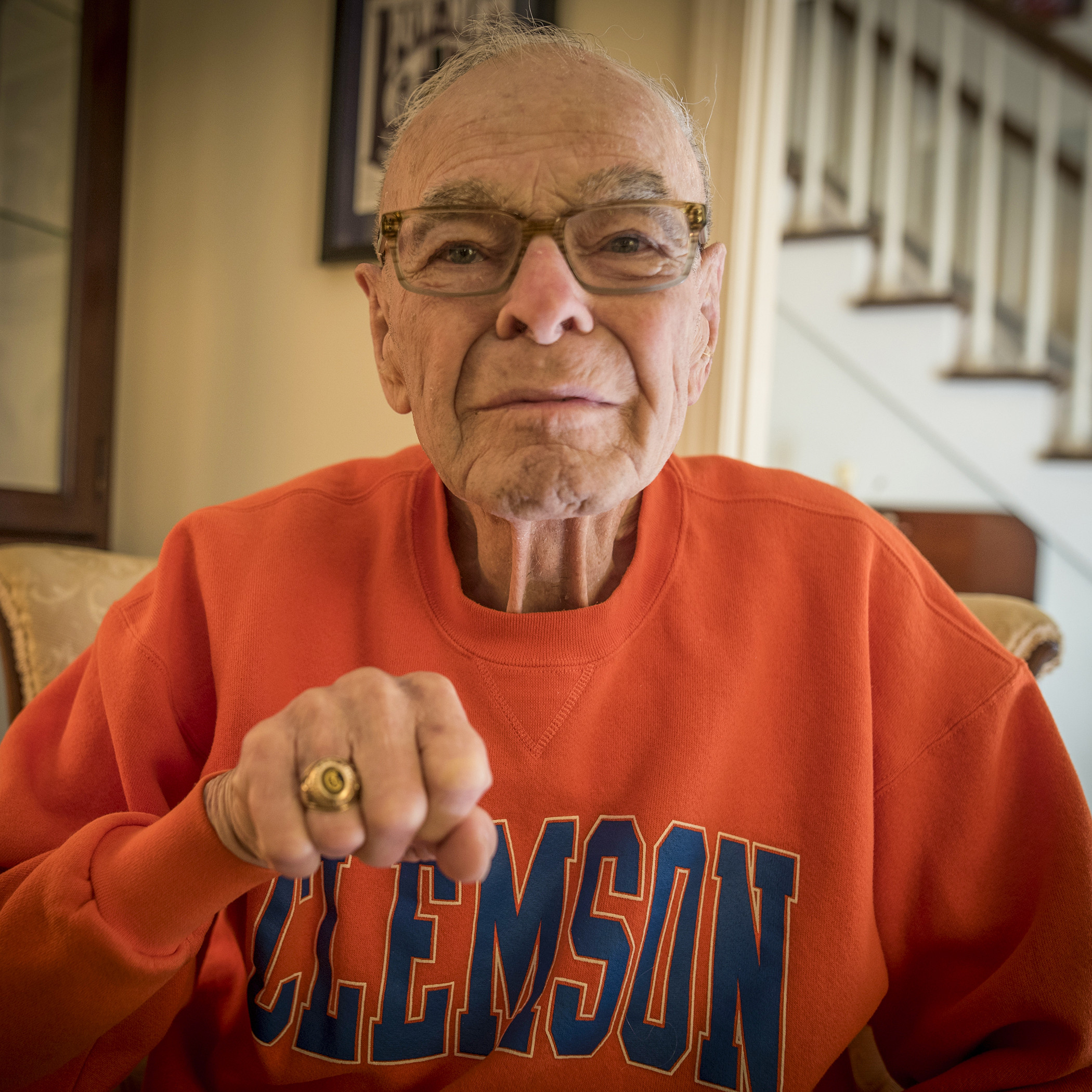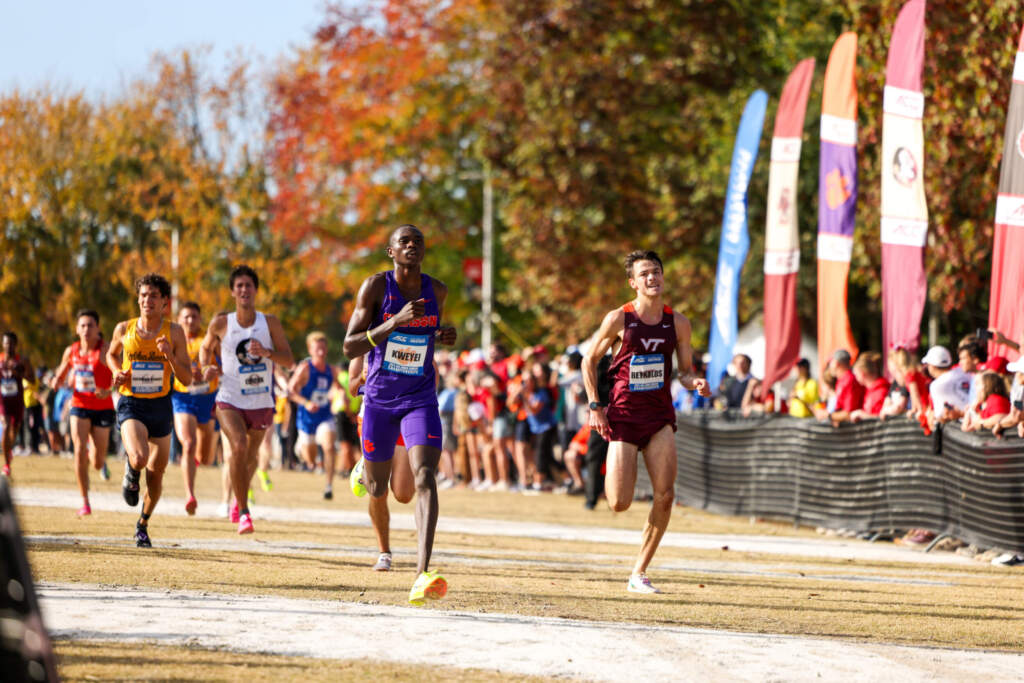Note: The following appears in the The Citadel gameday football program. To purchase a copy of the program while supplies last, send a check for $7 to Clemson Athletic Communications; P.O. Box 31; Clemson, SC 29633 with your return address.
United States Army 1st Lt. William Funchess watched from the other bank as Chinese soldiers approached the river, undressed and swam across naked, holding weapons and clothes over their heads. Once they hit his side of the river, they shook the freezing water off their skin, dressed and ran into the forest, one after the other after the other…thousands of them.
It was Nov. 4, 1950. When Funchess radioed the brass back at headquarters to tell them what he had seen, they told him he was mistaken. There were no Chinese soldiers in North Korea.
“The final instructions from battalion headquarters was, if Chinese soldiers are in Korea, they’re protecting hydroelectric plants,” explained Funchess. “Under no conditions will you fire on a Chinese national. Before the day ended, I had been struck by machine gun fire, and I was a POW of the Chinese army.”
Funchess remained a prisoner for nearly three years…34 months to be exact…and endured unimaginable torment at their hands. They tried to break his body, reprogram his mind and crush his spirit.
They found out that Funchess is a survivor.
EARNING HIS STRIPES
William H. “Bill” Funchess was born in 1927 in Orangeburg County in South Carolina, the son of William Sr., and Daisy Funchess. They farmed peanuts, cotton, corn and other “truck crops,” which they hauled 55 miles to the market in Columbia.
In 1920, William Sr., took a one-year agricultural course at what was then Clemson College that had a lasting impact on his life that he passed on to his children. Inevitably, the Funchess family developed an everlasting love for Clemson football. By the time he was eight, Bill had his sights set on becoming a Tiger, too.
“There was never any question,” said Funchess, now 90, from his home less than a mile from the Clemson campus. “It was destined that I associate myself with Clemson. It was ingrained in me, and I could not have had a better choice.”
He became an Army Reserve Officers’ Training Corps cadet at Clemson, which was then an all-male military college, in 1944, when he was just 16. America was still deep in the throes of fighting World War II.
“I had 25 or 30 different roommates,” he recalled. “They were constantly being drafted and replaced with another roommate.”
He graduated in 1948 as a newly-commissioned second lieutenant and was in Korea less than two years later with the 24th Infantry Division at the beginning of the next great war.
Funchess found himself ill-equipped and unprepared for Korea’s extremely rough and mountainous terrain, with a South Korean army in disarray and fleeing a much better-trained and equipped North Korean army. His unit was sent into the fray with World War II equipment and weapons.
He was promoted to first lieutenant after the Battle of Pusan Perimeter, a pivotal victory that stopped the communist invasion in its tracks. He was put in charge of 1st Platoon, Company C, 19th Infantry Regiment, and ordered to take his 50 men and move north across the border into North Korea.
His unit made better progress than anticipated, pushing through forests and small towns until they found themselves only 25 or 30 miles from the Chinese border. Funchess had 12 South Korean soldiers in his unit, and through them, he was able to get scattered information from people in the villages they passed through. Reports of armed Chinese soldiers became more and more common the further north they went.
He suddenly received orders to stop his advance and begin an immediate withdrawal. His unit retreated to the town of Anju, where they joined Companies A and B and prepared to engage. Funchess’ Company C had the rearmost position.
“My commander said, ‘Funchess, you’ve been in Korea longer than anyone here. We’re going to put you in the rear.’ I said, ‘Don’t do me any favors!’
“I had been there long enough to have learned they didn’t hit you head-on. I dug all my foxholes pointing south. The other officers started laughing at me…‘said old Funchess there doesn’t know which way the front is.’ But I was very concerned.”
Rightfully so, it turned out. The Chinese army swarmed across the river and leveled a fierce attack on the Americans from the south. Funchess and his men dug in and fought with everything they had to halt the Chinese advance.
A bullet tore through his right foot as he and his surviving soldiers finally attempted to fall back and join the rest of the battalion. The machine gunner who shot him was so close that he heard the bolt go back. Soldiers behind him were all killed by the spray of bullets.
Two soldiers grabbed him under his arms and tried to carry him, but one was shot and fell away. Funchess and his remaining companion limped through the snow until they reached the edge of a canyon. They could go no further. Dozens of Chinese soldiers surrounded them.
Funchess and his men had held their position just long enough for the rest of the battalion, about 700 men, to escape. They would pay a very high price for their stand.
His voice is steady, but his eyes focus somewhere else as he recounts the events of that day.
“The rest of the battalion never had a shot fired at them, but I lost my entire platoon, either killed or captured.”
Funchess was one of hundreds of prisoners taken. They were forced on a 17-night death march, north through the mountains, in the bitter cold. Those who fell out were executed.
Walking on one foot with a hole blasted through it, Funchess was the last in line. Time and again, his Chinese guards encouraged him to quit, but he knew what that meant. He pretended not to understand them and kept walking.
“I tore up my knees and my elbows and the palms of my hands from falling. It was absolutely horrible. But I knew I had to keep going because I did not want to suffer the alternative. I hadn’t been married very long and I was determined to get back to my wife, Sybil.”
The prisoners were offered no water and very little food. They survived by eating snow.
After a few days, his unit was merged with prisoners from the 8th Cavalry Regiment, who had been fighting about 25 miles to the east. They were marched en masse to a cluster of mud huts and dirt paths on the frozen banks of the Yalu River, near the city of Pyoktong.
This would be their home for longer than any of them dared imagine.
CARING FOR A SAINT
Funchess survived the first weeks in the camp by eating ice, snow and millet. Three months into his captivity, he got his first real drink of water.
“I was hobbling around on my bad foot, looking for anything I could find to eat or drink or use in any way. I saw an old man huddled over a small fire. He had a piece of tin with the edges turned up and he was melting snow. This man called out to me, ‘Would you care for a drink of hot water?’ He gave me about a half cup of warm water.”
Even today, his eyes close gently as he remembers that drink.
“It tasted so good.”
His eyes open.
“That man was Father Emil Kapaun.”
Kapaun, an Army chaplain, was already revered among the other prisoners when Funchess met him. During the thick of the fighting, Kapaun had repeatedly walked into direct lines of fire to comfort and retrieve wounded soldiers.
When an evacuation was ordered, he stayed behind to tend to the wounded and comfort the dying even after the enemy broke through the lines and hand-to-hand combat broke out all around him.
As he was being led away, he saw a Chinese soldier about to execute a wounded American. Kapaun pushed the enemy soldier aside, picked up the wounded man and carried and supported him until they reached the camp.
Kapaun continued to care for and comfort soldiers in the Pyoktong camp any way he could, like he did for Funchess that day. Temperatures dropped to -28 degrees, but Kapaun would sneak out at night to steal food and firewood to feed and warm his fellow prisoners. He dressed wounds, offered words of encouragement and said prayers with any soldier who needed it despite brutal retaliations from his captors, who had open contempt for Kapaun’s galvanizing effect on the prisoners.
When Kapaun himself became deathly ill, he was thrown into the same mud hut as Funchess and 14 other officers. Funchess cleared a space on the floor next to him and cared for Kapaun as the chaplain’s health declined.
“There were no Catholics in my room, and I think that’s the reason they put him in with us,” said Funchess. “They thought we would not take care of him. I took it upon myself to take care of him, and it was just about like taking care of a baby. I had to spoon-feed him.
“When he’d mess up his clothes, I’d take off his pants and put them outside for five or 10 minutes and it would freeze. I’d either beat it up against a wall and shake the dried fecal matter off or take a stick and scrape it off.
“There was no water to wash things with, and even if there had been, it would have been frozen. The human mind cannot comprehend how primitive it was.”
Funchess cared for Kapaun for six weeks, day and night.
“He was from a farm in Pilson, Kan., so we had a lot in common. When he got cold and shivering, I’d wrap my arms around him. Sometimes he’d wrap his arms around me and we’d talk about our boyhood days on the farm. We became very, very close friends.”
The communists were not happy to see Funchess caring for Kapaun. One day, eight Chinese soldiers burst into the hut unannounced and declared they were taking Kapaun to the hospital.
“We knew what the hospital was,” said Funchess. “It was an abandoned Buddhist monastery on the mountain that we called ‘the death house.” Very, very few returned from there.”
The POWs scuffled with the Chinese soldiers, pleading with them to let Kapaun stay.
“But of course, they prevailed because they had the guns.”
Kapaun died on May 23, 1951. Funchess’ eyewitness accounts of Kapaun’s acts of gallantry and compassion were used to qualify him for the Medal of Honor, which was awarded in 2013.
The citation reads in part, “Chaplain Emil J. Kapaun repeatedly risked his own life to save the lives of hundreds of fellow Americans. His extraordinary courage, faith and leadership inspired thousands of prisoners to survive hellish conditions, resist enemy indoctrination and retain their faith in God and country.”
In an unprecedented turn, Funchess’ testimony was also used by the Vatican to determine if Kapaun should be recognized as a saint. (Kapaun was named a Servant of God in 1993, and on June 21, 2016, the six historical consultants of the Congregation for Saints voted to accept the official document of Kapaun’s life that was ultimately passed to Pope Francis.)
FINAL INJUSTICE & RELEASE
Kapaun’s suffering had ended, but Funchess would remain a captive for over two more years, enduring constant interrogations, assaults and humiliations.
He was beaten, starved, fed grain sorghum, forced to stand at attention for extended periods of time and any other number of abuses. He soon weighed less than 100 pounds, but he remained resilient.
Prisoners were subjected to daily propaganda sessions in an attempt to brainwash and intimidate them into renouncing their countries and faiths. Funchess actively resisted, at one point standing up and calling the speakers liars for claiming Americans had committed genocide in a town called Anok. It just so happened that he had been on a patrol through Anok before his capture. Funchess and his men heard gunshots and observed people burying bodies in a mass grave, but withdrew without engaging anyone.
“They had photographs of that mass grave. The Chinese officers said this is proof positive of the atrocities committed by the United States Army in Anok.
“I took it as long as I could, but then I stood and said, ‘It’s a damn lie! The atrocities were committed by North Koreans against North Koreans!’ The Chinese officer snapped back at me…’How do you know?’ I said I was there and I saw what happened.”
Funchess was dragged away, stripped and ordered to stand at attention for several hours outside a building while high-ranking Chinese and North Korean officers met inside. Unbeknownst to him, this was a trial and he, standing naked in the snow, was the defendant.
Back home, life pressed on without him. His father passed away, his wife moved back in with her parents uncertain if he was alive or dead and his beloved Tigers went undefeated and won the 1951 Orange Bowl.
The Korean Armistice Agreement was made in July 1953, but the POW exchange did not end until Sept. 5. In a final excruciating twist, Funchess watched every other POW taken away to freedom until only he remained. He asked his captors why he was being kept behind.
“They said, ‘You are not a POW.’ That was shocking! I’m not a POW? What am I? They said, ‘You’re a war criminal’.”
He still shakes his head in disbelief as he recounts their explanation.
“I had been found guilty of war crimes in Anok when we never even fired a shot there.”
Funchess spent one day longer in captivity, alone in the camp. It was the longest day of his life.
The next day, Sept. 6, he was driven alone to a field and ordered to go down a path that cut to the tree line.
He walked towards the forest at the edge of the field, every step wondering if he would be shot in the back. He walked through the trees until the guns at his back disappeared. He continued in eerie silence, alone in no-man’s land, until he saw a U.S. Army ambulance parked with its back doors open and two men in uniform standing, one on each side. They were waiting for him.
After 1,038 days of captivity, he was free.
HOME AGAIN
Funchess was dusted with DDT to kill the lice, got a shower and a new uniform and was flown by helicopter to the South Korean port city of Inchon to catch a ship back to America.
“The minute I stepped off the helicopter, I heard somebody call out, ‘Hey Fungo! Don’t you know the Clemson football season has started?’ It was three of my Clemson schoolmates.”
Funchess’ homecoming was everything one might imagine. Hundreds of people, including his mother and his wife, met him at the airport in Columbia. Clemson was slated to play its rival, South Carolina, on “Big Thursday” a few weeks later, so Funchess wrote a letter to head coach Frank Howard telling him who he was, what he’d been through and asked if he could buy a couple of tickets to the game.
“It wasn’t three days later a letter came to me from coach Howard. He enclosed two tickets and said these are complimentary, saying ‘You don’t owe us anything.’ I think Clemson won that game, too.”
It probably felt like a win to him, but Clemson lost 14-7.
His brother had taken over the farm after his father’s death, so Funchess went to work at the only place that made sense to him…Clemson University. He became a student again to earn his master’s degree in agronomy and proceeded to work for the Clemson Extension Service for 30 years, mentoring and educating farmers in some of South Carolina’s most rural counties, earning the titles of district extension leader and associate professor.
His experiences in Korea went largely unknown during his post-military career. Like so many veterans of that time, he never sought accolades or attention for what he went through for his country. His family knew, but few others did.
Nevertheless, his ordeal as a POW made deep marks in him that proved almost impossible to process, until 1997, when he decided to do something about it.
“I got yellow pads, ballpoint pens and spiral notebooks and started writing. The minute I finished writing, the nightmares stopped.”
The resulting book, “Korea POW: A Thousand Days of Torment, November 4, 1950 – September 6, 1953” was published in 2002. Sales benefit the South Carolina Military Museum in Columbia.
His story reads like a Tom Clancy novel, and Funchess said even he has a hard time believing it’s true sometimes. But he’s grateful that he’s alive to tell it.
“I never felt any shame for being captured. The circumstances were me and one other man with one carbine and no ammo, surrounded by 40 or 50 Chinese soldiers. There was no alternative. I don’t consider myself a hero.
“I’m a survivor.”
 Syracuse
Syracuse 
 Virginia
Virginia  Florida State
Florida State  Wake Forest
Wake Forest  Miami (Fla.)
Miami (Fla.)  Alabama
Alabama  Tennessee
Tennessee  Charlotte
Charlotte  USC Upstate
USC Upstate  Ohio State
Ohio State  Georgia State`
Georgia State`  Ohio University
Ohio University  Virginia Tech
Virginia Tech  Indiana
Indiana  Tiger Classic
Tiger Classic  South Carolina
South Carolina  South Carolina
South Carolina  Campbell
Campbell  UAB
UAB  East Tennessee State
East Tennessee State  LSU
LSU  South Carolina
South Carolina  App State
App State  North Carolina A&T
North Carolina A&T  Charlotte
Charlotte  Pittsburgh
Pittsburgh  Troy
Troy  Georgia
Georgia  Cougar Classic
Cougar Classic  Georgia
Georgia  VCU
VCU  Stanford
Stanford  Elon
Elon  USC Upstate
USC Upstate  Georgia Tech
Georgia Tech  Wofford
Wofford  SMU
SMU  California
California  Queens
Queens  Georgetown
Georgetown  Norfolk State
Norfolk State  Louisville
Louisville  Charleston Southern
Charleston Southern  Mason Rudolph Championship
Mason Rudolph Championship 





